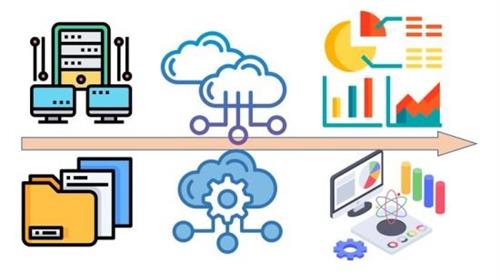- Thread Starter
- #1
Mastering Data Integration Patterns

Published 9/2024
MP4 | Video: h264, 1280x720 | Audio: AAC, 44.1 KHz, 2 Ch
Language: English | Duration: 35m | Size: 314 MB
Mastering Data Integration: Design, Development and Management
What you'll learn
Understand the fundamentals of data integration and its applications in business intelligence.
Analyze and design data integration architectures and models.
Develop robust data integration pipelines using best practices for data extraction, transformation, and loading.
Deploy and manage data integration solutions with modern deployment practices (CI/CD).
Tackle advanced integration challenges such as real-time and big data integration.
Keep up with emerging trends in cloud-based platforms and governance techniques.
Requirements
Basic Understanding of Databases and SQL
Familiarity with Data Management Concepts (Preferred)
Knowledge of Business Intelligence (BI) Concepts (Preferred)
Exposure to ETL Tools and Technologies (Optional)
Basic Understanding of Cloud Computing (Optional)
Description
This six-module course takes you through every stage of data integration, from fundamental concepts to advanced techniques and modern trends. You will learn to analyze, design, develop, deploy, and manage data integration solutions that enhance business intelligence and unlock the power of your data assets.Course Modules:Module 1: Introduction to Data IntegrationThis introductory module lays the foundation for understanding data integration.Key Topics:What is data integration?Challenges and benefits of data integration.Business use cases for data integration.Introduction to data integration architectures: ETL, ELT, Data Vault.Introduction to Business Intelligence (BI) and its relationship to data integration.Module 2: Data Integration AnalysisThis module focuses on analyzing your data environment and defining integration needs.Key Topics efining data integration requirements.Source system analysis and profiling.Data quality assessment and cleansing techniques.Data volume analysis and target system mapping.Introduction to data integration modeling concepts.Module 3: Data Integration DesignLearn how to design an effective data integration solution in this module.Macro Design Best Practices:Source system selection and prioritization.Data transformation strategies.Target system design considerations.Micro Design Best Practices:Component-based design principles.Physical data integration modeling techniques.Coding standards and documentation practices.Data security and access control considerations.Module 4: Data Integration DevelopmentThis module covers the development phase, transforming design into action.Key Topics
efining data integration requirements.Source system analysis and profiling.Data quality assessment and cleansing techniques.Data volume analysis and target system mapping.Introduction to data integration modeling concepts.Module 3: Data Integration DesignLearn how to design an effective data integration solution in this module.Macro Design Best Practices:Source system selection and prioritization.Data transformation strategies.Target system design considerations.Micro Design Best Practices:Component-based design principles.Physical data integration modeling techniques.Coding standards and documentation practices.Data security and access control considerations.Module 4: Data Integration DevelopmentThis module covers the development phase, transforming design into action.Key Topics ata extraction techniques: full vs. incremental loads.Change data capture (CDC) methods.Error handling and data integrity checks.Data transformation and cleansing in development environments.Unit testing and integration testing strategies for data integration processes.Module 5: Data Integration Deployment and ManagementEffective deployment and management are crucial for sustainable data integration.Key Topics:Building and deploying data integration pipelines.Continuous integration and continuous delivery (CI/CD) for data integration.Data integration monitoring and performance optimization techniques.Production support considerations and troubleshooting procedures.Module 6: Advanced Data Integration Topics with Modern TrendsThe final module explores advanced data integration concepts and emerging trends.Key Topics:Real-time data integration best practices.Big data integration challenges and solutions.Cloud-based data integration platforms.Data integration governance and metadata management.Emerging trends in data integration.
ata extraction techniques: full vs. incremental loads.Change data capture (CDC) methods.Error handling and data integrity checks.Data transformation and cleansing in development environments.Unit testing and integration testing strategies for data integration processes.Module 5: Data Integration Deployment and ManagementEffective deployment and management are crucial for sustainable data integration.Key Topics:Building and deploying data integration pipelines.Continuous integration and continuous delivery (CI/CD) for data integration.Data integration monitoring and performance optimization techniques.Production support considerations and troubleshooting procedures.Module 6: Advanced Data Integration Topics with Modern TrendsThe final module explores advanced data integration concepts and emerging trends.Key Topics:Real-time data integration best practices.Big data integration challenges and solutions.Cloud-based data integration platforms.Data integration governance and metadata management.Emerging trends in data integration.
Who this course is for
Data professionals (data analysts, data engineers) seeking to expand their knowledge of integration processes.
IT professionals involved in managing or implementing data systems.
Developers and engineers interested in learning more about ETL processes and data management.
Business intelligence professionals wanting to deepen their understanding of how integrated data supports BI systems.
Anyone looking to build or improve data integration solutions within their organization.
Homepage:

Download link
rapidgator.net:
nitroflare.com:

Published 9/2024
MP4 | Video: h264, 1280x720 | Audio: AAC, 44.1 KHz, 2 Ch
Language: English | Duration: 35m | Size: 314 MB
What you'll learn
Understand the fundamentals of data integration and its applications in business intelligence.
Analyze and design data integration architectures and models.
Develop robust data integration pipelines using best practices for data extraction, transformation, and loading.
Deploy and manage data integration solutions with modern deployment practices (CI/CD).
Tackle advanced integration challenges such as real-time and big data integration.
Keep up with emerging trends in cloud-based platforms and governance techniques.
Requirements
Basic Understanding of Databases and SQL
Familiarity with Data Management Concepts (Preferred)
Knowledge of Business Intelligence (BI) Concepts (Preferred)
Exposure to ETL Tools and Technologies (Optional)
Basic Understanding of Cloud Computing (Optional)
Description
This six-module course takes you through every stage of data integration, from fundamental concepts to advanced techniques and modern trends. You will learn to analyze, design, develop, deploy, and manage data integration solutions that enhance business intelligence and unlock the power of your data assets.Course Modules:Module 1: Introduction to Data IntegrationThis introductory module lays the foundation for understanding data integration.Key Topics:What is data integration?Challenges and benefits of data integration.Business use cases for data integration.Introduction to data integration architectures: ETL, ELT, Data Vault.Introduction to Business Intelligence (BI) and its relationship to data integration.Module 2: Data Integration AnalysisThis module focuses on analyzing your data environment and defining integration needs.Key Topics
Who this course is for
Data professionals (data analysts, data engineers) seeking to expand their knowledge of integration processes.
IT professionals involved in managing or implementing data systems.
Developers and engineers interested in learning more about ETL processes and data management.
Business intelligence professionals wanting to deepen their understanding of how integrated data supports BI systems.
Anyone looking to build or improve data integration solutions within their organization.
Homepage:
Screenshots

Download link
rapidgator.net:
You must reply in thread to view hidden text.
nitroflare.com:
You must reply in thread to view hidden text.
